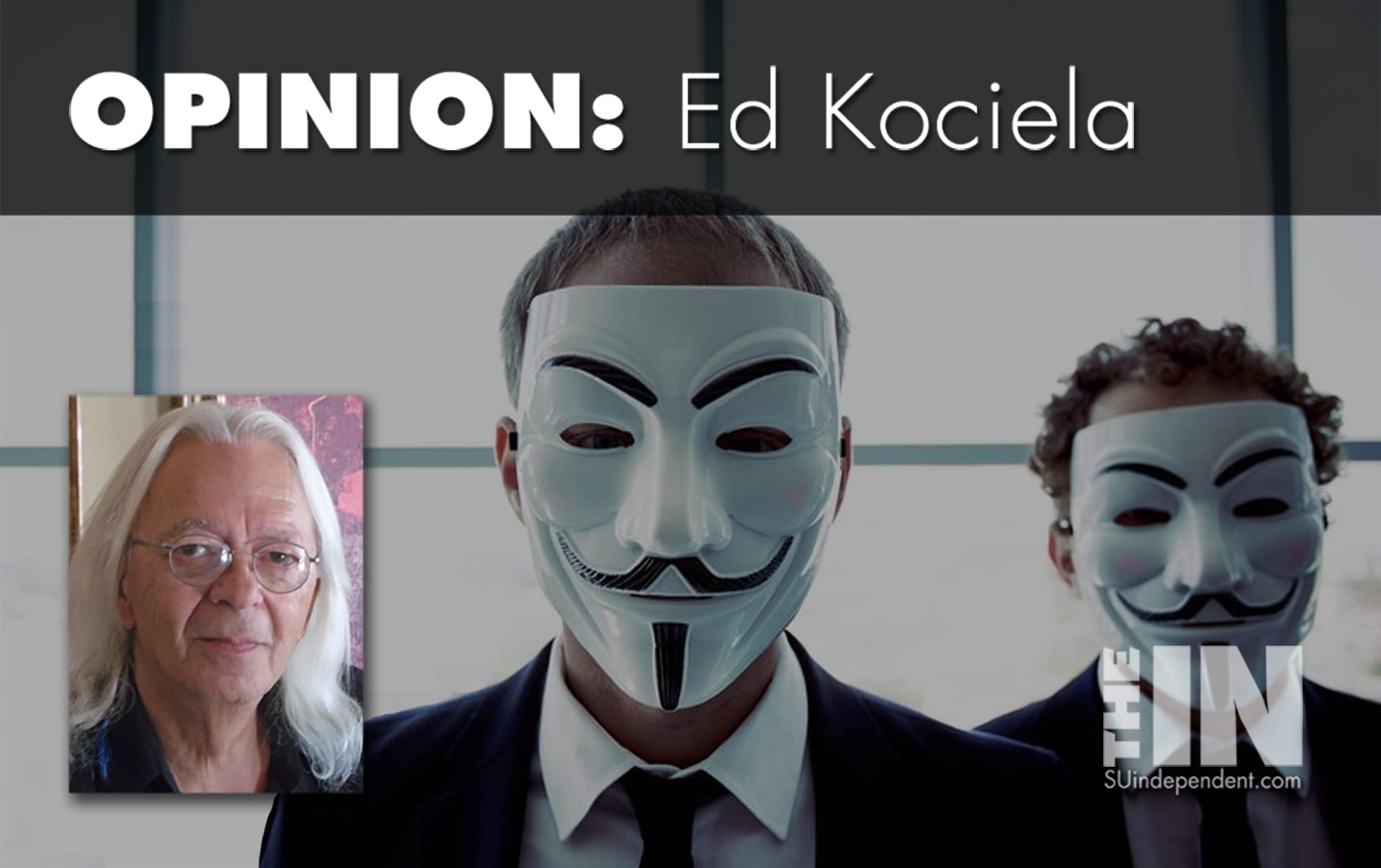
Media 101, Anonymous Sources, and Accurately Reporting the News
By Ed Kociela
I can certainly understand why so many people have such a problem with the so-called mainstream media, particularly the entertainers on CNN, MSNBC, and Fox News. They seem more intent on opinion-making than reporting.
It confuses many who are not trained in the finer points of journalism who confuse those shows for a network’s news coverage.
Even though clips culled from straight news reportage may be included in those shows, the premise is to rile the viewer one way or another in a visceral response instead of absorbing the information as opinion or analysis. It can taint the viewer’s perspective, cause them to hate the media. I mean, if you think Sean Hannity, Rachel Maddow, or Don Lemon – as talented as these folks are at what they do – are presenting what we have traditionally called “news,” then you are dreadfully mistaken.
None of those folks, or anyone else who is referred to these days as a “news anchor” is an actual foot soldier slugging it out in the trenches for the day’s news report. They are there simply because they are attractive, able to string words together nicely, and are provocative.
Nevertheless, we are also talking about legitimate media here. Not some baseless little link you found on Facebook, Twitter, Instagram, or any other place where fake news is most often generated and disseminated in a hyper-real media that is a hybrid of the real and the imaginary.
The lines are more clearly defined in print media where the daily package is divvied up in sections, with a specific chunk set aside for opinions and analysis.
I can understand why so many, especially those in the broadcast world, drift to the entertainment part of the business. You get more money, more attention, your own show, your own name, your own following. Plus, it is much simpler taking the research and stories from the reporters who grind it out and chase stories.
It’s cushy, it’s prestigious, it’s lucrative, and it’s easier quite frankly because everybody has an opinion about everything and you can cherry-pick whatever supports your agenda.
There was a time when being a columnist was a role aspiring scribes strived to achieve at some point in their career – a position where they could pursue the purity of writing without the limits of straight-up reporting, whose opinions were considered valid, whose storytelling was considered the poetic log of history.
A writer had to make one’s bones back then to get a column. They had to write magical prose, engage readers with flair and clever wordsmithing, and develop a thick hide to deflect the slings and arrows of the unwashed masses who were always ready to storm the castle with their torches and pitchforks.
I can also understand how, to the untrained eye, the use of anonymous sources could cast a skeptical shadow on reporting.
The fact is, the legit agencies have very stringent procedures for using anonymous sources. Whether you work at the little hometown paper of the nation’s newspaper of record, The New York Times, the standards are the same: a reporter alone cannot grant anonymity to a source.
The policy at the New York Times is generally followed at reputable news-gathering agencies across the globe: “Besides the reporter, at least one editor must know the identity of the source. A high-ranking editor must approve the use of anonymous sources in any story, usually a department head like the international editor or the Washington bureau chief, or their deputies. When the anonymous sourcing is central to the story, it generally must be approved by an even higher-ranking editor like a deputy managing editor.”
Editors do not like anonymous sources and go to great lengths to persuade the person to put their name behind the information. However, there are times when reprisals are likely – loss of a job, professional relationships, even personal safety – which are legitimate reasons to grant anonymity.
As the City Editor at The Spectrum/Daily News, I occasionally had to be in that vetting process on anonymous sources. I was able to convince most to put their name to their quotes. Previously, as a reporter, I very rarely used anonymous sources, and when I did, it was only after discussions with my editors. Trust me; it’s no fun being interrogated by your editor.
But, as history has shown, anonymous sources have proven invaluable. Without them, we would have never known the information revealed in the Pentagon Papers, as delivered by Daniel Ellsberg, or the inside job handled by Richard Nixon’s thugs at the DNC break-in as revealed by Mark Felt, better known as “Deep Throat” during the Watergate reportage.
Nobody liked the reporting on the Pentagon Papers because it was tainted with a stink that covered both parties.
Republicans were unhappy with the reporting on the Watergate scandal because it exposed Richard Nixon as a petty crook.
Democrats were unhappy with the reporting on the Bill Clinton-Monica Lewinsky scandal because it made their man look like a lecherous old fool and a liar.
We could go on and on, of course, with equal doses of discontent, but the point is, as Mark Twain said, that “a newspaper is not just for reporting the news as it is, but to make people mad enough to do something about it.”
You can talk about contextualizing all you want, misquoting all you want. Still, when it comes to the straight news reportage by established news agencies as opposed to the cherry-picking that goes on with many of the entertainers on the air or the propaganda machines disguised as media, you will find that it is minimal, extremely rare.
Yes, always be discerning. Fact check until your fingers bleed and your brain hurts. Seek multiple sources. In journalism school, we are taught that if your mother says she loves you, get a second source. Realize that coincidence is rare and that hoaxes and conspiracies are almost impossible to pull off. The world is not that random, and secrets are always exposed at some point.
Most importantly, understand that the business of news gathering is not a simple job, that there are rules, standards, codes of behavior that govern it tightly to protect credibility. You may argue “the media” is biased. Realize that, in many ways, you are the media as expressed by the information you share on one of the various platforms, by the comments you make. It’s no longer the league of newspapers, magazines, and broadcasters that ply their trade at long-standing news reporting agencies; it is also the users of that information and how they share it. It’s how the myths and lies are perpetrated on all sides, how information can rapidly deteriorate into misinformation and muddle the senses.
Finally, whether you like it or not, there are women and men in the reporting business who still hold their responsibility as a sacred trust in the search for the truth. Indeed, we have had incidents of deceit and bias. Not everybody works under the same banner, to be sure, and there is a great emphasis at the corporate level for viewership, clicks, readership, because of the money on the table. So dial past Maddow, Hannity, and Lemon, if you choose. Avoid Rush Limbaugh if you desire and pick up the Wall Street Journal instead of the New York Times if it suits you better. Hook yourself up online with the Associated Press or Reuters news links instead of the alternative media that populate both sides, or news outlets you simply do not trust.
It might help you get a better feel and more respect for those ink-stained wretches whose job it is to serve as watchdogs for the masses.
It can be a tough job.
So please, before you knock or find reasons to disparage the profession – understand that just because somebody can sit at a keyboard and pound out a sentence does not mean they are a good writer or that they should be competing for the front page of the Washington Post. No matter what their partner, mother, father, brother, sister, or best friend says to the contrary.
It’s as ridiculous as saying that just because somebody watched every episode of “House,” they can perform a thoracic aortic dissection repair.
Just be thankful that there are those out there who can.
Viewpoints and perspectives expressed throughout The Independent are those of the individual contributors. They do not necessarily reflect those held by the staff of The Independent or our advertising sponsors. Your comments, rebuttals, and contributions are welcome in accordance with our Terms of Service. Please be respectful and abide by our Community Rules. If you have privacy concerns you can view our Privacy Policy here. Thank you!
Click here to submit an article, guest opinion piece, or a Letter to the Editor





I agree with Ed Kociela: We are inundated with biased news on what I refer to as AM radio or TV. Not only do I subscribe to a local news source I read The Guardian, BBC, several energy and water publications to examine the issues of resource management. I actually have enjoyed the white papers of the libertarian CATO Institute
I have listened to the entertainment news which seems to come up readily while driving and as much public broadcasting which becomes more focused on singular issues not so helpful in understanding our national interest.
I am distressed Americans don’t understand issues such as job outsourcing, corporate influence and hoarding of wealth in offshore banking.
Of course public education is under attack and a liberal education, which the founding fathers had a better grasp of, is considered worthless.
I would include Reporters Without Boarders as a source of reading and the freedom of the Press.
Generally, the reporters and anchors on the major network stations (ABC, NBC and CBS) are credentialed journalists and those sources of information actually fact-check what they report. Examples of those who reported things that turned out false — Dan Rather and Brian Williams — were both fired from extremely lucrative and prestigious top anchor positions on CBS and NBC, respectively. Truth is required by those organizations. Believe it or not, the news department at CNN does too, but too often their “talking heads” are passed off as news people. Fox News claims to report accurately but obviously fact-checks nothing, and they introduce their hosts Hannity, Carlson,) as if they were reporters. They’re entertainers, talking heads. MSNBC is the liberal equivalent of Fox News. And best of all, if you’re actually seeking accuracy, is PBS — specifically “The Newshour” shown weekday evenings at our St. George location — KUER. It’s the gold standard of accuracy and truth telling.